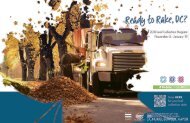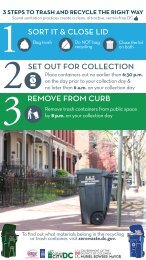DPW FY 2017 Annual Report
You also want an ePaper? Increase the reach of your titles
YUMPU automatically turns print PDFs into web optimized ePapers that Google loves.
Page 13<br />
Office of Waste Diversion<br />
(OWD)<br />
To implement the Sustainable Waste Management Act, <strong>DPW</strong><br />
formed the Office of Waste Diversion to lead <strong>DPW</strong>’s Zero<br />
Waste DC effort. OWD is charged with strengthening<br />
the District’s sustainability efforts through education and<br />
resources to reduce waste and increase recycling and<br />
composting.<br />
<strong>DPW</strong> chairs the Interagency Waste Reduction Working<br />
Group, which includes the Departments of Energy and<br />
Environment, General Services, and Parks and Recreation.<br />
Through the Working Group, the District speaks with one<br />
voice in developing and providing resources to help residents,<br />
businesses, and visitors move toward zero waste, which is<br />
defined as diverting 80% of waste by 2032.<br />
The group’s actions include developing and implementing cost<br />
effective strategies to convert waste to resources, improve<br />
human and environmental health, reduce greenhouse gas<br />
emissions, create inclusive economic opportunity, and<br />
conserve natural resources.<br />
OWD engages the public on multiple levels, including<br />
presentations to residents, stakeholders, non-profits and<br />
industry groups through the Zero Waste website, social<br />
media, Live Chats, webinars and an advertising campaign<br />
about the new recyclable items the District will accept.<br />
OWD is exploring options to reduce organic waste with the<br />
understanding that large scale progress requires larger<br />
scale efforts. To that end, OWD commissioned a composting<br />
collection progress and feasibility study to identify how<br />
much organic waste was being generated annually and get<br />
recommendations to take composting to the next level.<br />
The Solid Waste Diversion <strong>Report</strong> estimates that<br />
the total amount of organic waste—food and yard<br />
waste—generated in the District each year is<br />
between 166,810 and 234,774 tons. This represents<br />
a substantial portion of the District’s total citywide<br />
solid waste stream and offers a sizable opportunity<br />
to increase the residential solid waste diversion<br />
rate, which was 23.1% in <strong>FY</strong> <strong>2017</strong>.<br />
Residential Solid Waste Diversion Rate<br />
23.1%<br />
A primary recommendation is to build an organics<br />
processing facility that would help pave the way<br />
for curbside composting collection within five years.<br />
The 2023 Capital Budget allocates $8 million for<br />
the construction of such a site. Once rolled out to all<br />
<strong>DPW</strong>-serviced residents, the total annualized cost of<br />
the program is estimated to be between $5.9 and<br />
$9 million per year. The report also estimates the<br />
creation of between 68 and 114 new full-time jobs.<br />
<strong>DPW</strong> is evaluating this recommendation.<br />
The report was released in the spring of <strong>2017</strong> and<br />
is accessible on both <strong>DPW</strong>’s and the Zero Waste<br />
DC website(zerowaste.dc.gov).<br />
Each year,<br />
166,810+<br />
tons of organic waste is<br />
generated in the District







